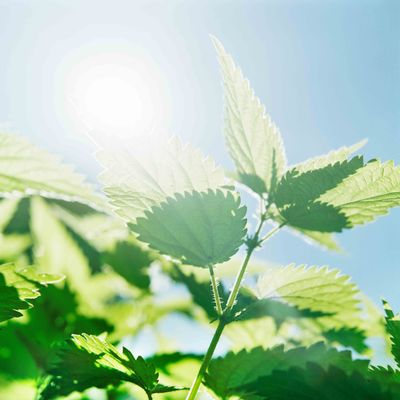
It’s spring, which means my eyes are itching, breathing is impossible, I can’t stop sneezing, and I’m due for a sinus infection any day now. Yes, I suffer from (incredibly annoying) hay fever, and I usually end up spending allergy season popping Claritin, stocking up on nasal spray at Duane Reade, and toting around my handy Neti Pot purse. But I’ve heard from friends that I might want to add “drinking nettle tea” to my allergy relief checklist, as nettles are thought by some to potentially provide natural hay fever relief. So, to find out if nettles can actually help — or if they might actually make my hay fever even worse — I consulted with two experts.
First of all, what are nettles? Well, at the very basic level, nettles are herbs that have leaves, roots, and stems. They’re also known as “stinging nettles” because their leaves have fine hairs that contain irritants, so if you happen to accidentally brush up against one while you’re out hiking, it might feel like you got stung by something (like a bee), registered dietitian Brigitte Zeitlin told me. But at the same time, nettles are known to have anti-inflammatory properties, so they’re often used to help treat muscles and joints, arthritis, and eczema either through topical creams, teas, or capsules, Zeitlin noted.
So, what about allergies? You may have come across friends or random blogs that tout the alleged hay fever–relieving powers of nettles. But as it turns out, there’s little to no science to support the belief that nettles can help ease someone’s allergies, according to Dr. Maureen George, an associate professor at Columbia University School of Nursing and council member of the Asthma and Allergy Foundation of America. “It is not a natural therapy that I recommend to my patients,” Dr. George told me.
Oh no. Do nettles have any effect on allergies? Dr. George told me that there’s a “little bit” of scientific work on the potential benefits of nettles on allergies, including one small study from 2000, which only had 23 people in it, and two other review papers (that merely looked at the fact that people claim nettles are beneficial). But in contrast, Dr. George noted that there are “about a dozen papers” that actually talk about people being allergic to stinging nettles. That means, instead of actually helping with your hay fever, there is more evidence to suggest that nettles could make it worse. “If you look at the science of people being allergic to it, it contains products that actually would induce allergies [including pollen],” Dr. George added.
Should anyone use nettles, in that case? Sure, nettles might be beneficial for some people, according to Zeitlin. As I mentioned, nettles have anti-inflammatory properties, so they could potentially be a good idea for someone who has joint or muscle pain, or arthritis. Nettles also act as a diuretic, so they can help if you’re feeling bloated, according to Zeitlin.
But who should stay away from nettles? Well, obviously if you’re allergic to nettles, steer clear of them. But otherwise, Zeitlin recommends that anyone who wants to use nettles check with their doctor first, because they can interact with certain medications. She also noted that nettles are a bad idea for pregnant women and people with kidney issues. So in general, the registered dietitian only recommends people use nettles if they have inflammation and check with their doctor first. “It’s not something I would generally suggest people add to their diet,” Zeitlin said.





